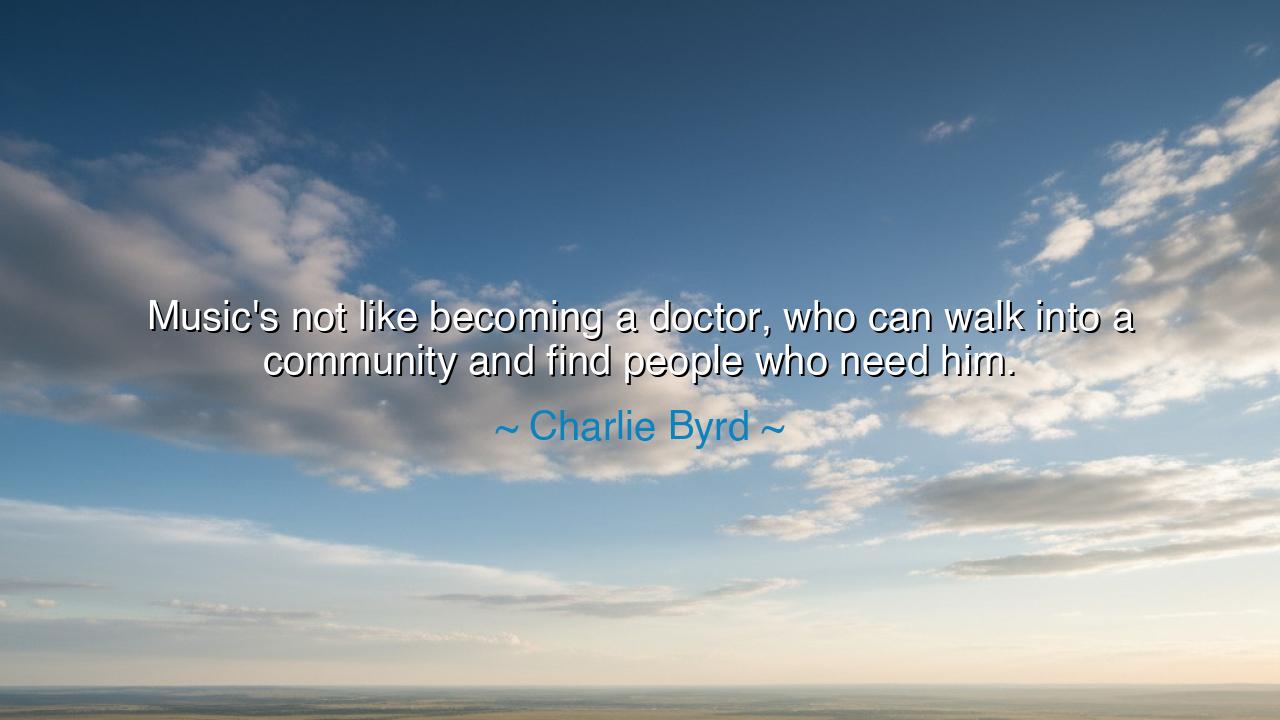
Music's not like becoming a doctor, who can walk into a
Music's not like becoming a doctor, who can walk into a community and find people who need him.






Hear the words of Charlie Byrd, the jazz guitarist who wove the rhythms of Brazil with the traditions of America, who declared: “Music's not like becoming a doctor, who can walk into a community and find people who need him.” At first, these words appear humble, almost self-effacing, but within them lies a profound truth about the nature of music and the calling of the artist. For while the doctor’s necessity is obvious, the musician’s role is less certain, less tangible, yet no less vital.
The first wisdom here lies in the recognition of need. A doctor enters a community and finds the ill, the suffering, the broken in body. His work is clear, his duty defined. But the musician does not arrive with the same certainty. People may not know they need music, nor ask for it with their lips. Yet their hearts thirst for it, even if unspoken. In this way, music is like water to those dying of thirst but unaware of their own hunger. The difference is that the doctor heals wounds seen by the eyes, while the musician heals wounds hidden within the soul.
Byrd’s words also carry humility about the artist’s role. To be a musician is not to wield scalpel or medicine, but to work with sound and silence, with rhythm and harmony. The world may survive without song, but it cannot truly live without it. The doctor preserves life; the musician enriches it. One rescues from death, the other teaches what it means to be alive. Byrd reminds us that the artist must often walk a lonelier path, one where his gift is not always sought, yet still desperately needed.
History bears witness to this hidden necessity. During the Second World War, when cities were bombed and spirits were low, musicians like Vera Lynn sang to soldiers and citizens alike. Her songs were not medicine for the body, but they gave hope, courage, and the strength to endure. While doctors tended wounds of flesh, music tended wounds of the spirit. Though no one called for it with prescriptions, the people’s souls knew they needed it.
Consider also Beethoven, who, though deaf, poured his heart into symphonies that spoke of triumph over despair. He could not cure illness, but his music gave courage to millions who struggled in silence. His Ninth Symphony, with its “Ode to Joy,” became an anthem for unity and hope, crossing borders and centuries. Here we see the truth of Byrd’s words: music may not be a profession of obvious necessity, but its power to heal the unseen is as great as any medicine.
The lesson is clear: while music may not appear as essential as bread or as urgent as medicine, it is food for the soul and healing for the heart. Do not underestimate its power simply because its need is not always visible. For every community, every human heart, holds within it unspoken longings, unhealed sorrows, unexpressed joys. Music gives voice to these things, shaping them into sound, and in doing so, it heals in ways unseen.
Practical wisdom follows: if you are an artist, do not despair that your work is not valued as immediately as that of others. Walk into the world with courage, knowing that even if your calling is not demanded, it is still deeply needed. Offer your music, your art, your words freely, and you will find that, though people may not ask for it, they will be transformed by it. And if you are not an artist, seek the musicians, honor their work, and let their gifts tend the wounds of your soul.
Thus remember Charlie Byrd’s words: “Music's not like becoming a doctor, who can walk into a community and find people who need him.” Yes, the musician’s need may be hidden, yet it is no less real. For while the doctor sustains life, the musician makes life worth sustaining. Together they serve the body and the spirit, two halves of the same whole. Honor both, and you will live not only in health, but in wholeness.






AAdministratorAdministrator
Welcome, honored guests. Please leave a comment, we will respond soon